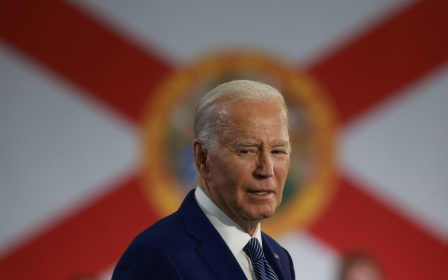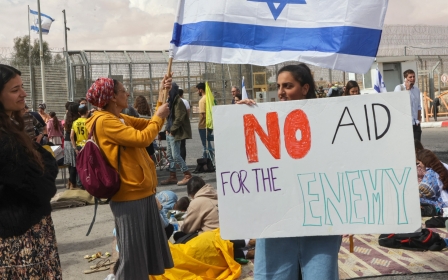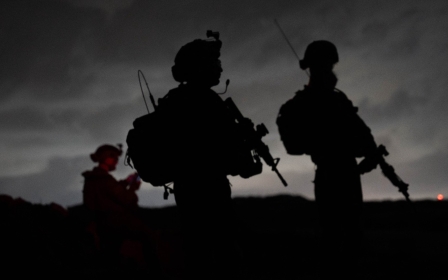Biden's threat to withhold arms to Israel masks divisions over the fate of Hamas

The CIA director brushed aside in high-stakes truce talks. The US president's warnings about civilian Palestinian casualties ignored. And private discussions about billions of dollars in arms transfers leaked to the media.
In recent weeks, the Biden administration took a flurry of Israeli transgressions on the chin.
But when it finally decided to react, it was a carefully choreographed jab - the promise that it would withhold offensive weapons from Israel if it launched a full-scale assault on Rafah.
Frank Lowenstein, a former special envoy for Israeli-Palestinian negotiations in the Obama administration, told Middle East Eye that for a long time the Israelis "barely paid lip-service to US concerns".
"After two months of handwringing, the White House came to the conclusion that the Israelis do not care what we say. They only care what we do."
Stay informed with MEE's newsletters
Sign up to get the latest alerts, insights and analysis, starting with Turkey Unpacked
Biden's historic public threat to withhold arms and munitions to Israel was the culmination of months of tensions, but the decision came reluctantly, current and former US officials familiar with the deliberations told MEE.
Last week, the Biden administration decided to delay a shipment of 1,800 2,000-pound bombs and 1,700 500-pound bombs to Israel, out of concern they could be used in Rafah. There were weeks of discussions, which included disagreements, among Biden's advisors on whether to leverage the flow of arms, the current and former US officials told MEE.
'Nobody in the administration wanted this to be public'
- Former US official
Biden's top Middle East advisor on the National Security Council Brett McGurk opposed conditioning arms sales. But Jon Finer, another key Biden advisor, who has led outreach to Arab Americans riled over US support for Israel, along with Jake Sullivan and Antony Blinken, supported the move, current and former US officials told MEE.
After the decision was made, Prime Minister Benjamin Netanyahu’s government mobilised, leaking the story on Sunday to Axios.
"Nobody in the administration wanted this to be public," the former senior US official told MEE.
The White House then came clean.
First, the pause was reported through an unnamed US official on Tuesday, then publicly via US Secretary of Defence Lloyd Austin at a Senate hearing. More weapons systems could also be held up if Israel launched a full-scale attack on Rafah, the State Department said later in the day.
Biden finally weighed in on CNN. He admitted that US bombs had been used by Israel to kill civilians. "It's just wrong," he said.
"If they go into Rafah, I'm not supplying the weapons that have been used historically to deal with Rafah, to deal with the cities, that deal with that problem," he said, threatening to withhold bombs and artillery shells to the Israeli military.
Biden's warning sets up a historic showdown between the US and its closest ally.
There is precedent for the US withholding arms to Israel. US President Ronald Reagan halted the delivery of artillery shells and cluster bombs when Israel invaded Lebanon in 1982. The following year, he conditioned the transfer of F-16s on Israel’s military withdrawal from Lebanon.
But Biden's stance marks the first time a US president has preemptively threatened to withhold arms to stop an Israeli attack.
'Carefuly scripted warning'
The decision to announce it on primetime television means Biden's decision to follow through on the threat is going to be tracked minute by minute by US voters, and America's friends and foes in the Middle East.
Israeli officials, intent on continuing to wage war on Gaza after the Hamas-led 7 October attacks, are already in a verbal joust with the administration.
Michael Herzog, Israel's ambassador to the US, said Biden's move was "very unfortunate. I think it sends the wrong message to Hamas and to our enemies in the region".
In a video on Thursday, Prime Minister Benjamin Netanyahu doubled down on his threat to launch a full-scale attack on Rafah: "If we need to stand alone, we will stand alone. As I've already said, we will fight with our fingernails."
'The US is operating off a script driven by the realities on the ground that Hamas will survive'
- Aaron David Miller, former State Department official
In reality, Biden's threat likely leaves enough room for the US and its closest Middle East ally to work around a "Rubicon moment" that would force the US leader's hand, marking a very public, and nasty rift, in ties.
"This was an unmistakable but carefully scripted warning on a very limited issue," Aaron David Miller, a senior fellow at the Carnegie Endowment for International Peace and a former US State Department Middle East negotiator, told MEE.
Israel sent tanks and troops into Rafah on Monday night. It later seized control of the Rafah border crossing with Egypt and launched air and artillery strikes. Israeli soldiers are engaged in fierce fighting with Hamas in Rafah. The Israeli attack has already forced 80,000 Palestinians to flee, according to the UN.
But Biden said Israel's assault had "not yet" crossed his red line, conditioning his threat to an Israeli full-scale assault on "population centres" in Rafah and what other US officials have characterised as a major attack.
On Thursday, White House national security spokesman John Kirby said Israel's assault so far matched the "more precise, more targeted, more limited kinds of operations" that the White House had pressed Israel to conduct in Rafah.
"This is more of pink line," Lowenstein said.
"Biden will do everything he can to avoid escalating this fight… but if you see big bombs getting dropped on the centre of Rafah, this spat will get ugly."
The focal point may be Rafah, but the border town turned sprawling refugee camp, currently sheltering over 1.2 million Palestinians, is just one part of a more menacing diplomatic dillema the White House faces in Gaza.
'Step in right direction'
Since 7 October, the Biden administration has approved more than 100 weapons sales to Israel. While Biden's CNN interview has stolen the headlines, the US president also gave a speech this week slamming Hamas and pledging "ironclad" US support for Israel’s security.
Biden's current pause on munitions transfers also doesn't impact the roughly $26bn in military and humanitarian aid that his administration approved for Israel in April.
Biden is trying to balance support for Israel, with deepening frustration in the Democratic Party over Israel’s offensive on Gaza. More than 34,000 Palestinians, mainly women and children, have been killed in Israel's military assault, according to Palestinian health officials. There are also an estimated 10,000 Palestinians buried under the rubble of flattened buildings, according to the Palestinian civil defence.
Gregory Meeks, the top Democrat on the House Foreign Affairs committee, has already used his power to put a hold on an $18bn arms transfer for Israel, which includes F-15 fighter jets.
Meanwhile, progressive outrage over US support for Israel has manifested in historic pro-Palestinian demonstrations at college campuses.
On Friday, the State Department is expected to submit a report to Congress, required under a new national security memorandum, on Israel's use of US-supplied weapons in Gaza. Underlining the tightrope Biden is walking, Axios reported that the administration will criticise Israel, but rule that it has not violated humanitarian law with US weapons.
The domestic battle lines over Biden's stance on Rafah have already been drawn.
Progressive lawmakers like Senator Bernie Sanders and Elizabeth Warren welcomed it as "a step in the right direction", while Republicans and pro-Israel lobbying groups have condemned it.
The White House hopes that a ceasefire based on a phased release of hostages in Gaza can mollify its progressive base before the November elections.
The administration also wants space to work with Arab leaders on a day-after plan for Gaza, which is growing more necessary as the besieged enclave slides into lawlessness and famine, current and former US officials have told MEE.
Allusive ceasefire
Part of the Biden administration's decision to publicly threaten arms transfers to Israel stems from a view in the White House that Netanyahu is torpedoing peace talks, the current and former officials say.
Just before Israel launched its attack on Rafah, Hamas agreed to a ceasefire proposal drafted by Qatar and Egypt that MEE reported had the backing of CIA director Bill Burns. Israel plowed ahead with its assault on Rafah anyway, where it says four Hamas battalions are based.
Analysts and experts say that inherent in the ceasefire proposal Burns backed is the uncomfortable admission that Israel has failed in its goal of destroying Hamas. After having laid siege to Gaza for months, US officials now say publicly that attacking Rafah - Hamas's last stronghold - will not defeat the group. Israel has also now repeatedly launched operations against Hamas in neighbourhoods in northern Gaza they had previously declared as cleared.
But Israeli officials are still casting a Rafah attack as necessary to eliminate the group. "Nobody presented to me, or to us, a strategy of defeating Hamas without dealing with Rafah," Herzog, Israel's ambassador, said.
Hamas officials meanwhile have refused to budge from the proposal they accepted earlier this week. In a sign that the talks are stalled, Burns, the US's chief negotiator, departed Cairo, Egypt, on Thursday.
The sticking point to the talks has been the second and last phases of the agreement that calls for a permanent ceasefire, the full withdrawal of Israeli forces from the Gaza Strip, and an end to the siege.
US officials have been unable to publicly reconcile Burns' backing of the ceasefire, as reported by MEE, with the White House's position to help Israel defeat Hamas.
"An enduring defeat of Hamas certainly remains the Israeli goal, and we share that goal with them," Kirby said on Thursday.
Biden told CNN the US promised Israel to "help you get" Yahya Sinwar, Hamas's leader in Gaza. But by threatening to restrict Israel's ability to operate in Rafah and agreeing to a permanent ceasefire, the US is tacitly accepting Hamas's presence in Gaza, analysts say.
"The US is operating off a script driven by the realities on the ground that Hamas will survive either as an insurgency or as a force in Palestinian politics, influencing matters through intimidation or co-optation" Miller said.
Middle East Eye delivers independent and unrivalled coverage and analysis of the Middle East, North Africa and beyond. To learn more about republishing this content and the associated fees, please fill out this form. More about MEE can be found here.







